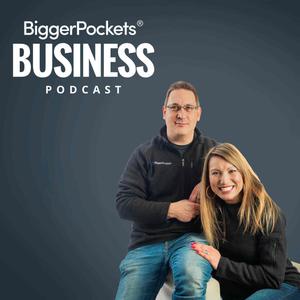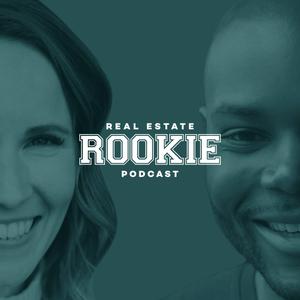
BiggerPockets Business Podcast
[email protected]
Welcome to a real-world MBA, where entrepreneurs guide you through what it really takes to start, scale, and sell your own business.Your hosts: J and Carol Scott, who left careers in corporate management to launch their own house-flipping business. Every Tuesday, you'll meet a new guest and learn actionable tips for hiring, firing, marketing, raising capital and more.So whether you're looking to boost profits or bring a new idea to life, you'll come away informed and inspired. Tune in, and learn how to treat your business like a business!
- 1 hour 14 minutes105: The MOST Profitable Skill to Learn (From a $200M+ VC Investor) with Codie Sanchez
Successful business owners are addicted to building businesses, sometimes to their folly. For someone like Codie Sanchez, this isn’t a problem, but a superpower. Codie is a journalist, a venture capital partner, an angel investor, and an entrepreneur. She loves, as she puts it, “building herself out of a job”, which means creating businesses with huge potential, getting a team in place, and heading on to better things.
Now, managing many millions of dollars, she has to look into which businesses are worth capital investments. Codie often advises business owners to act out of confidence, not fear, and consistently hire people that are better at their jobs than them. She places a very high value on having employees and workers who are competent and can help the team grow (as any smart business owner should).
Codie mentions the most profitable skill of today and how she’s using that specific skill to grow her newsletter, Contrarian Thinking. She argues that in today’s society, the top level of hierarchies for time freedom and ideological freedom is financial freedom. If you can decide what you do, where you do it from, what you can and can’t say, and how to live your life, you have the ultimate freedom available.
This episode delves not only into the life of a VC, but how small businesses can keep their loyal customers, grow their audiences, and repel those who aren’t a good fit for them. Regardless of the size of business you have, Codie presents great arguments for everyone about developing yourself, your business, and your mindset.
In This Episode We Cover
- Laying the foundation of businesses and “building yourself out of a job”
- How to extract yourself from your business and empower long-term success
- Contrarian thinking and why it’s a crucial skill in today’s society
- How to start a “high margin, low people” business
- The one skill you should start building upon today
- How to make your audience loyal and push away those who won’t like your offering
- And So Much More!
Links from the Show
Check the full show notes here: https://www.biggerpockets.com/bizshow105
Learn more about your ad choices. Visit megaphone.fm/adchoices
27 April 2021, 6:00 am - 1 hour 52 seconds104: How Anyone, Anywhere, Can Start Buying Profitable Real Estate with Andrew Luong
It’s hard for real estate investors to get started, especially without a mentor, a background in real estate, or an existing network. Many of those interested in buying profitable, cash-flowing real estate are busy with their 9-5 job or even running their own business. This was at least the case for landlord and founder of Doorvest, Andrew Luong, when he talked to his friends about buying rental properties.
Andrew had a passion for real estate and knew that it was one of the best ways to make residual side-income. When he chatted up friends about real estate, they were interested too. Andrew would send them to agents, property managers, show them profit margins, and more. After a few months when Andrew would ask his friends how their real estate was going, they would reply “I didn’t have time to do any of it, will you just do it for me?”
Just like that, Doorvest was born. Doorvest allows aspiring investors, regardless of where they’re at in the world, to purchase renovated, cash-flowing properties with management fully built-in. Not only does this help make a potential landlord’s life much, much easier, it also lowers the barrier of entry for anyone trying to get into real estate!
In This Episode We Cover
- Resisting lifestyle creep so you can invest in your assets and businesses
- Letting your day job subsidize the other business opportunities around you
- Why most people won’t pursue real estate investing
- Capitalizing on the leads you get, and making it as easy as possible for them to purchase/invest
- Building systems and processes so you can be fully remote when running your business
- Using existing data to make your real estate search more profitable
- And So Much More!
Links from the Show
Check the full show notes here: http://biggerpockets.com/bizshow104
Learn more about your ad choices. Visit megaphone.fm/adchoices
20 April 2021, 6:00 am - 1 hour 8 minutes103: Are You Seen as Credible in A Customer’s Eye? with Mitchell Levy
What does it mean to be credible? Are you showing up and providing for your customers, your partners, and the world as a whole? These are questions that today’s guest, Mitchell Levy has been asking. Mitchell is an expert on credibility and is trying to make not only business, but the world a more credible place to live and work.
Mitchell has been working in Silicon Valley for over 30 years. When he left his last job at Sun Microsystems, he did right at the cusp of the dot com and ecommerce era. He became an e-commerce consultant and started selling SEO packages. Then he created executive business programs for top colleges, ran multiple CEO groups, started a publishing company, and wrote over 60 books!
To find clarity and credibility, Mitchell says that you need to find a customer's CPoP, the customer’s point of pain. When you can accurately find your customer’s CPoP, you can change the way you speak to them, you can see what they want, and most importantly, you can tailor your business to fit their needs. This type of credibility goes beyond just your business. You should also be known as credible within your circle of influence and online, Mitch shows you how to get there!
In This Episode We Cover
- Why credibility is so important in today’s day and age
- Knowing who your audience is so you can solve their problems
- Finding your customer’s point of pain
- Making the world a better place through credible business
- How to make your online presence and LinkedIn stand out
- And So Much More!
Links from the Show
- BiggerPockets Forums
- Clubhouse
- BEing Seen & BEing Heard as a Thought Leader! Ted TalkX
- EZNow
- Thinkific
- J's Linkedin Profile
Check the full show notes here: https://www.biggerpockets.com/bizshow103
Learn more about your ad choices. Visit megaphone.fm/adchoices
13 April 2021, 6:00 am - 1 hour 1 minute102: Are You Ready to Take the Entrepreneurial Leap? with Gino Wickman
Many business owners and entrepreneurs have read books like Traction and Rocket Fuel, both of which talk about how to build a successful business, partnership, and how to use the EOS (entrepreneurial operating system). Today we have on the author of both those books, and a new book Entrepreneurial Leap, Gino Wickman.
Gino always had the entrepreneurial drive in him, but wasn’t able to label it for a long period of time. He went to work out of high school and found himself transforming his family business into something that was not only profitable, but would sell for a high price. Gino learned that his “gift” was helping entrepreneurs make their businesses more lean, efficient, and profitable.
We walk through many different components of being an entrepreneur, such as the six key traits of successful business builders, the eight critical mistakes entrepreneurs make, and how to know where you’re at on the “entrepreneurial range”. Gino argues that although many people want to be entrepreneurs, it may not be the most logical decision for them. Likewise, many of those who are successful at corporate jobs may be better served leading their own teams. There’s only one way to find out, get Gino’s new book!
In This Episode We Cover
- What the EOS - Entrepreneurial Operating System is
- How to know whether or not you’re a natural entrepreneur
- The entrepreneurial range and where you may stand on it
- The 8 most critical mistakes of entrepreneurs
- How getting sidetracked can derail a successful business
- Whether or not you’re a “partner person”
- And So Much More!
Links from the Show
- BiggerPockets Forums
- Entrepreneurial Leap Assessment
- Elon Musk
- Ray Kroc
- Jeff Bezos
- Steve Jobs
- Entrepreneurial Leap Biz Match Tool
- Entrepreneurial Leap Cheat Sheet
Check the full show notes here: https://www.biggerpockets.com/bizshow102
Learn more about your ad choices. Visit megaphone.fm/adchoices
6 April 2021, 6:00 am - 1 hour 9 minutes101: Acquiring a $1.5M Business with Only $10k Out of Pocket with Nigel Guisinger & Sean Ade
We buy and sell a lot of different assets like houses, stocks, and even bitcoin (sometimes). But what about buying and selling businesses? Business acquisitions can seem like an entirely different world, but they aren’t too different from the regular buying and selling of assets we do every day.
Today’s show features Nigel Guisinger, who you may remember from the wildly popular episode that aired almost exactly a year ago. Last time Nigel talked about buying businesses using seller financing, and now he’s brought a real-world example! With Nigel is his partner and mentee, Sean Ade.
Earlier in 2020, Sean was looking for a business he could buy and take over. Sean had been getting into house plants during the early COVID-19 lockdowns and looked to see if nurseries were worth buying. After sending some lackluster deals to his partner, Nigel, he was notified that a terrarium shop was closing. Sean consulted with the owner and sent the profit and loss statement to Nigel who confirmed that it was a winner
Sean and Nigel used some very creative financing to get a $1,500,000 business under contract for just $10,000 out of pocket. This episode isn’t just an eye-opener for those who overlook buying businesses as assets, but also for those who don’t know what's possible in financing a business purchase!
In This Episode We Cover
- The opportunity of the “business crash” happening right now
- Looking for businesses that fit with your interests
- The importance of having cash flow from day one of ownership
- Profit and loss statements, equity, and valuations of businesses
- Small Business Administration (SBA) loans
- When and how to hire your first employee after you buy an existing business
- And So Much More!
Links from the Show
- BiggerPockets Business Podcast 51: Business Opportunity Is Knocking… Answer the Door! With Nigel Guisinger
- GoBundance
- BizBuySell
- Venmo
- Paypal
- Square
Check the full show notes here: http://biggerpockets.com/bizshow101
Learn more about your ad choices. Visit megaphone.fm/adchoices
30 March 2021, 6:00 am - 1 hour 10 minutes100: You Can't Fear Failure: Scott Trench on the Evolution of BiggerPockets
How does a 27 year old become the CEO of a major online brand? Not only that, how does a 27 year old take an online brand, build upon it, and create something better? Well, if your name is Scott Trench, the answer is: a lot of hard work, some tough decisions, and looking out for the customer whenever possible.
Before he was head honcho at BiggerPockets, Scott was a financial analyst in the corporate world. He wasn’t too happy, and spent all his free time finding the best (and quickest) ways to reach financial freedom so he didn’t have to go to a 9-5 for the next 40 years of his life. Without many investments or rental properties, Scott was introduced to the founder of BiggerPockets, Josh Dorkin.
Josh saw something in Scott, and hired him as the third employee of BiggerPockets. Scott was given the title “Director of Operations” which really meant taking care of the finances for the business and making sure everyone had their coffee. Scott started acquiring more properties as he worked with Josh and later became such a crucial part of the BiggerPockets family, he was promoted to president. When Josh decided to step away to be with his family, Scott became CEO.
In the 2 years he’s been CEO, he’s had to make some tough decisions such as changing the overall management structure of the company. This has helped BiggerPockets grow into a website and business that over 2,000,000 people use and love. When Scott isn’t running BiggerPockets, he’s playing rugby, gaming on his PC, or having a beer with a fellow investor!
In This Episode We Cover
- How Scott used the principles outlined in Set for Life to reach financial freedom
- Taking a chance and joining a very early stage startup
- The importance of having very low expenses when making hard decisions
- How to work with a private equity firm when they acquire part of your business
- NPS (net promoter scores) and why they’re crucial for continual business improvement
- Driving value for shareholders, without tarnishing your brand for customers
- Scott’s new book First Time Home Buyer
- And So Much More!
Links from the Show
- Mr Money Mustache
- BiggerPockets Business Podcast 01: How to Turn a Hobby Into a Booming Business (Then Get Your Life Back)—The BiggerPockets Story With Joshua Dorkin
- BiggerPockets Business Podcast 18: How to “Have It All” by Living with Intention with Brandon Turner
- BiggerPockets Real Estate Podcast
- BiggerPockets Money Podcast
- McCarthy Capital
- BiggerPockets Publishing
- BiggerPockets Podcast 297: Mastering the Decision-Making Process with Business (and World Series of Poker) Champion Annie Duke
- BiggerPockets Real Estate Rookie Podcast
- BiggerPockets Marketplace
- Pier 1
Check the full show notes here: http://biggerpockets.com/bizshow100
Learn more about your ad choices. Visit megaphone.fm/adchoices
23 March 2021, 6:00 am - 54 minutes 46 seconds99: Finding Profitable Opportunities Using “Deliberate Data” with Dr. John Johnson
Data can be a confusing topic for most people, but what about when it has to do with your business? How is your business using data? Are you even using data at all? Dr. John Johnson, expert witness, professor, and founder of Edgeworth Economics and Edgeworth Analytics argues for businesses using data to grow.
Dr. Johnson understands why so many people fall victim to studies and findings that may not be entirely accurate. He talks through confirmation bias and how we, as consumers, can find the red flags when listening to interpretations of data. We are urged to take time to think before we accept statistics and data as fact.
He also dives into how he started his own firms, Edgeworth Economics and Edgeworth Analytics, and how he himself uses data to track his firm’s growth, recruiting, and revenue. Often, his firm is hired to find why a product or group of products is or isn’t selling, which strategies make the most profitable sense, and how a business can change to ensure more sales. Aside from that, Dr. Johnson also acts as an expert witness in corporate lawsuits, sifting through the data to find out what is really true, and what has been inflated.
There’s no mistaking that data is important for modern businesses, but what’s more important is how you use and interpret this data to come up with accurate conclusions. His book, Everydata: The Misinformation Hidden in the Little Data You Consume Every Day goes into the data all around us, and how we can sift through it to find truth.
In This Episode We Cover
- The expert witness and testimony field
- Checking your own bias and making sure your decisions are based on accurate data
- Understanding the context around the data that is being recorded
- Tracking growth and recruiting so you know where you’re succeeding
- Using common sense when looking at different data points
- And So Much More!
Links from the Show
Check the full show notes here: http://biggerpockets.com/bizshow99
Learn more about your ad choices. Visit megaphone.fm/adchoices
16 March 2021, 6:00 am - 1 hour 12 minutes98: Build a Big Life, Not Just a Big Business: Advice from The Hosts of The Empire Building Podcast
How do you build a business that ties in healthily with your life? While you’re trying to bring in millions in revenue, are you there for your children, your spouse, your loved ones, or even yourself? If not, why are you building the business at all? This was a main topic of discussion for the hosts of the Empire Building Podcast, Wendy Papasan, Sarah Reynolds, Seychelle Van Poole, and Vija Williams.
Wendy, Sarah, Seychelle, and Vija have all grown massive real estate empires throughout their own respective markets. Now, they teach others to do the same through their podcast and their live event, Amplify. We talk through some key topics like how all these successful women juggle their business/personal lives, when the right time to say “no” is, how to grow your business, how to hire successfully, and knowing your numbers.
All agree that a big part of being successful is saying “no”. That doesn’t mean turning down everything, but it does mean saying no to things that will interrupt your time with family and friends. Sarah, specifically, talks about how she was unable to put her kids to bed most nights of the week, since she was coming home at 10PM from the office. What did she do? She made it a rule to leave by 5PM. This not only helped her be there for her daughter, but allowed her team to take bigger roles.
These four women all personify what it means to be successful in business and in life. Not only that, they can help you too find the best way to build a “big life” not just a big business.
In This Episode We Cover
- Answering the classic “how do you do it all?” question
- Running 7-figure real estate empires
- Being super selective with what you say “yes” to
- Defining your personal mission and looking at it daily
- Learning the power of hiring so your business can build sustainably
- Figuring out the profit/loss ratio of your life
- And So Much More!
Links from the Show
- Keller Williams
- BKCO Escrow
- AMPLIFY Event
- BiggerPockets Business Podcast 06: How to Manage Your Time Like a Millionaire With Jay Papasan
- Papasan Properties
- KWKC
Check the full show notes here: https://www.biggerpockets.com/bizshow98
Learn more about your ad choices. Visit megaphone.fm/adchoices
9 March 2021, 7:00 am - 56 minutes 11 seconds97: Put Profit First: How to Compound Your Business and Personal Income with Rocky Lalvani
Rocky Lalvani came to the United States as a small child. Like many immigrants, Rocky’s parents arrived with a small amount of money, around $25. As hard workers, they were consistently talking to their friends and relatives about how to make more money so they could have the coveted “American Dream”. This is how Rocky started his education in money and finances, and what pushed him to become wealthy.
Now, Rocky teaches businesses and entrepreneurs the Profit First system, which is exactly what it sounds like. A business usually calculates profits as sales - expenses = profits. Rocky argues that this is an inefficient way to see your true profit, and what the actual calculation should be is sales - profit = expenses.
You may be asking how to minimize expenses so the above formula can work. The solution to this isn’t that you need to manipulate the numbers so your expenses equal the difference between your sales and your profit, but that you need to minimize your expenses when possible. But what about fixed costs? What about startup costs? As Rocky puts it, you need to have a customer before you start having expenses, something businesses rarely realize is not only possible, but profitable.
Rocky also goes into his #1 tip for accumulating wealth and dives deep into why the phrase “the rich get richer” tends to be true. He also goes into how businesses can allocate their profits correctly, have the accurate amount for taxes, and pay themselves first so they’re making money while their money makes money!
In This Episode We Cover:
- How Rocky became a millionaire through compound interest
- What the Profit First system does for businesses and entrepreneurs
- Harnessing the 40% of your work that creates most of your profit
- Dismissing the notion that you need to spend more to grow
- How real estate investors can use Profit First in their businesses
- Setting up separate bank accounts and allocating your money
- And So Much More!
Links from the Show
- Dave Ramsey
- Home Depot
- BiggerPockets Business Podcast 06: How to Manage Your Time Like a Millionaire With Jay Papasan
- BiggerPockets Business Podcast 30: How to Guarantee Profit From Day 1 with Mike Michalowicz
Check the full show notes here: http://biggerpockets.com/bizshow97
Learn more about your ad choices. Visit megaphone.fm/adchoices
2 March 2021, 7:00 am - 1 hour 3 minutes96: Starting Successful Businesses with NO Industry Experience with Jeff Fenster
There are often standard prerequisites for starting a company. First, you need to go get a degree for a certain field, then you need to find a job that is in that field, then you need to stay in that job for 10 years to gain connections, and finally, you can start a business. Jeff Fenster, serial entrepreneur and founder of Everbowl thought this linear path was a bit outdated. If anything, Jeff thought it was slightly backwards!
Jeff planned on becoming a lawyer in college, but once he had his first child, realized that being away from home wasn’t for him. He got a sales job and became the top sales rep in his company. When the company started dangling bonuses over his head, he felt uncomfortable and knew that he needed to start his own thing.
He ended up founding a company that directly competed with his former employer, then sold that company, started another, sold that one, started a few more, sold those companies, and many companies later, he started Everbowl, a craft acai bowl and superfood company based out of San Diego.
If variety is the spice of life, then Jeff is doing things right! He argues that the best thing you can do is go into a completely new industry, focus on a problem that competitors are overlooking, build systems to make the industry better, and carve out a portion of the market. This strategy has worked well for him as he’s profitably sold and started many different companies. If you want his breakdown on his formula to success, you’ll have to tune in to this episode!
In This Episode We Cover:
- Why industry experience isn’t necessarily a prerequisite for success
- How “fresh eyes” disrupt stagnant markets and industries
- What to do before you try and solve a business’s problem
- Developing systems that beat competitors for you
- Addressing the not-so-obvious needs of customers
- Focusing on company culture and core values when building a business
- Leveraging your “relationship capital” for future opportunities
- And So Much More!
Links from the Show
- Amazon Alexa
- Blockbuster
- Netflix
- Blackberry
- iPhone
- Best Buy
- Amazon
- Ikea
- We Build Stuff
- Neil Patel
- Udemy
- Etsy
- Fiverr
- Freelancer.com
Check the full show notes here: http://biggerpockets.com/bizshow96
Learn more about your ad choices. Visit megaphone.fm/adchoices
23 February 2021, 7:00 am - 1 hour 20 minutes95: Developing Unstoppable Partnerships with Elliot Smith and Tucker Merrihew
Building businesses from the ground up isn’t easy. It requires patience, hard work, and most importantly, a solid team. Without trust in that team, the product, the company, and the vision can completely disintegrate. When a team flourishes, you can create a massive success, where everybody wins.
Tucker Merrihew and Elliot Smith have been working throughout the past year on Call Magic, a service that helps uncover leads for real estate agents, wholesalers, flippers, and other real estate professionals. Elliot originally teamed up with Cole Ruud-Johnson (who you’ll hear on our Real Estate Podcast, very soon), and everything was running well, but they realized they needed a leader. After Elliot talked to Tucker about the project, Tucker was in.
There was just one contingency: the product and the company had to be the best of the best. The three partners agreed to put their all into it, and respect each other’s work. Cole already had experience running an outsourced cold calling team, Elliot had years and years worth of real estate experience under his belt, and Tucker had the Real Dealz Podcast audience at his disposal.
Elliot and Tucker walk through setting up your business and your team for success, what to worry about and what to hold off on, hiring team members from overseas, and growing a business to scale, not fail.
In This Episode We Cover:
- What to look for in a business partner/what to look for in an existing partnership
- How to “dummy proof” your business
- Managing, paying, and hiring workers that are overseas
- How to have better cold call conversations that secure leads
- Setting out to become the best of the best in your industry
- Trusting your partners and letting them show their strengths when working together
- And So Much More!
Links from the Show
- BiggerPockets Real Estate Show
- BiggerPockets Podcast 381: 5 Rules for Investing in a Down Market with Tucker Merrihew
- Marketing Machines, Spec Houses, Flipping & Wholesaling | Podcast
- BiggerPockets Podcast 255: Six-Figure Real Estate Investing in Just 20 Hours a Week with Elliot Smith
- BiggerPockets Podcast 394: Making a 25 Deal/Year Business (and Marriage) Work… Together! with Elliot and Chrissy Smith
- Apple
- Tesla
Check the full show notes here: https://www.biggerpockets.com/bizshow95
Learn more about your ad choices. Visit megaphone.fm/adchoices
16 February 2021, 7:00 am - More Episodes? Get the App
Your feedback is valuable to us. Should you encounter any bugs, glitches, lack of functionality or other problems, please email us on [email protected] or join Moon.FM Telegram Group where you can talk directly to the dev team who are happy to answer any queries.
 BiggerPockets Money Podcast
BiggerPockets Money Podcast
 Real Estate Rookie
Real Estate Rookie
 BiggerPockets Daily
BiggerPockets Daily
 On The Market
On The Market
 BiggerPockets Real Estate Podcast
BiggerPockets Real Estate Podcast
 Rental Income Podcast With Dan Lane
Rental Income Podcast With Dan Lane